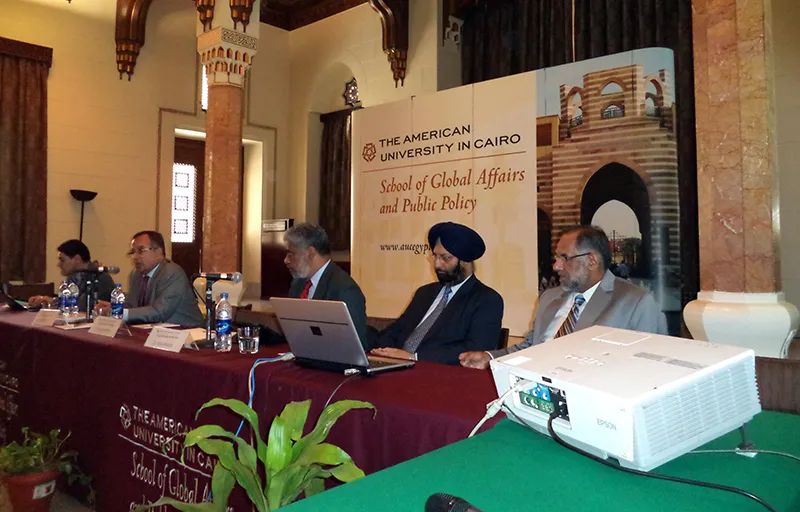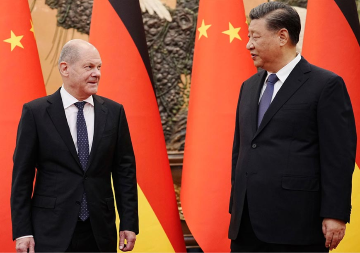Egypt and India have long had good relations with each other. Over the last few years, however, both nations have tended to be preoccupied elsewhere and their bilateral relationship has been left untended.

Egypt and India have long had good relations with each other. Over the last few years, however, both nations have tended to be preoccupied elsewhere and their bilateral relationship has been left untended. Whatever their individual trajectories, the fact remains that Egypt and India experience very similar predicaments and are faced with similar developmental challenges. Quite naturally too, it is to be expected that they will have a repertory of experiences that both can share and equally learn from.
With this central objective, the School of Global Affairs & Public Policy (GAPP) of the American University in Cairo (AUC) and Observer Research Foundation came together in Cairo early this June (9 & 10)to share and discuss their perspectives and experiences on themes ranging from geopolitical developments in the region, development challenges as well as the role of media in shaping political discourses.
At a time when both countries are engaged in reinventing themselves, there is need for them to find their identities and decide what they wish to be in the 21st century. In this context, it was noted that a sound foundation needs to be created in Egypt in the form of an openly debated and inclusive constitution before normal political processes can be expected to become possible. Dean of GAPP, Nabil Fahmy (now Interior Minister) while stressing the history of cooperation between Egypt and India, pointed to the opportunities for learning from both countries’ experiences and contexts towards building a future that is democratic, ethical and inclusive and one that features open societies consistent with rule of law.
Developments in the region
The so-called Arab Spring has begun questioning some of the governing structures in the region. At the same time, there has been a proliferation of factions with their own, often conflicting, visions of the future. The revolutionary process has demonstrated that there will be greater demand for enhanced participation in the political power structures and political processes with accountability and transparency.
Here again, there is pressing need to devise ways to address these growing aspirations for economic and social justice, for building inclusive and democratic governance structures and for nurturing strong yet open societies.
In many states in the region, there is visible growth of Islamic political ideologies and the Sunni-Shia sectarian divide is leading to geopolitical polarisation. This will have serious and lasting consequences.
In the background, the larger power shift between the West and Asia, the re-mapping of energy sources and demands and the fallout from the conflict within states in West Asia will profoundly re-shape the region.
Both India and Egypt, situated at either end of this tumultuous region, will be significantly impacted and it makes sense for them, with their history of cooperating in the Non-aligned movement, to share perspectives and devise strategies to work together to deal with the challenges that have begun cropping up in the West Asian region.
Socio-economic Challenges
In different ways, both Egypt and India face major growth and developmental challenges within their own states. As they struggle with catering to the needs of burgeoning populations in the context of increasing resource constraints, both nations will also need to balance their drive for economic growth with efforts towards ensuring economic equity and social justice.
A vital pointer in this direction was the fact that while the Tahrir Square protests began with political demands, very soon popular attention began to be focussed upon issues like unemployment, poverty, lack of social and political opportunities and the lack of services.
As governments struggle to meet these challenges, they will need to pay attention to larger design issues like the role of government agencies (the armed forces for example) in the ownership and control of economic activities, the patterns of economic growth and the role of the government as a ’provider’. Issues like devolution of powers, subsidies and social assistance as well as affirmative action will also need to be debated. It is possible that if these foundational issues are debated with intellectual rigour, a wide political consensus can emerge and be the basis for taking Egypt and India into a prosperous, equitable and democratic future.
Role of Media
Media can play a critical role in shaping the perceptions of and, often, the very course of social movements and this has been most visible in the context of recent protests in both Egypt and in India.
If we view Media as a public service, fairness, balance and integrity stand out as three vital characteristics. For media in both Egypt and India, there is much work to be done in this regard. The ways in which different media networks have interacted with and treated these issues in Egypt and India can provide important insights into understanding how (and under what circumstances) media can make a wholesome contribution towards consolidating open, democratic societies.
Avenues for Cooperation
The discussions highlighted the opportunities for cooperation between Egypt and India in terms of sharing experiences in governance and in managing a democratic polity.
The shared history of the non-aligned movement can be a template for Egypt and India to work towards shaping agendas and developments at the regional and global levels.
Perhaps the broad domain of development presents the greatest challenges to both countries and yet offers the greatest opportunities for mutual learning and cooperation. Sustainable development, urbanisation, globalisation and resource management (river waters for example) demand immediate attention and the two countries would do well to address some of these issues jointly.
Bi-laterally, India and Egypt already have a joint working group on space and it has been agreed to launch an Egyptian nano satellite on an Indian launch vehicle. Both countries have a joint working group on science and technology and have initiated a C.V. Raman Fellowships Programme wherein Egyptian scientists visit India for research and vice versa. Additionally, a MoU has been signed on information technology cooperation including areas like cyber security.
On the economic side, bilateral trade between the two countries has crossed 5.5 billion dollars and there is considerable focus on investments. Almost 50 Indian companies are involved in a broad range of operations in Egypt. With a broadening of the information and facilities being made available to investors, the trade and investment relationship between Egypt and India can increase significantly.
Culture and tourism are also very significant components of the relationship between the two countries. However, a lot more can be achieved in these areas if the countries were to institute broad programs of engaging with civil society.
Most significantly, in this regard, continued interactions between civil society actors on developmental, governance and international relations issues should be consolidated.
Conclusion
The first interaction between GAPP and ORF concluded with the intention of concretising and carrying forward the relationship into future years.
The views expressed above belong to the author(s). ORF research and analyses now available on Telegram! Click here to access our curated content — blogs, longforms and interviews.




 PREV
PREV

